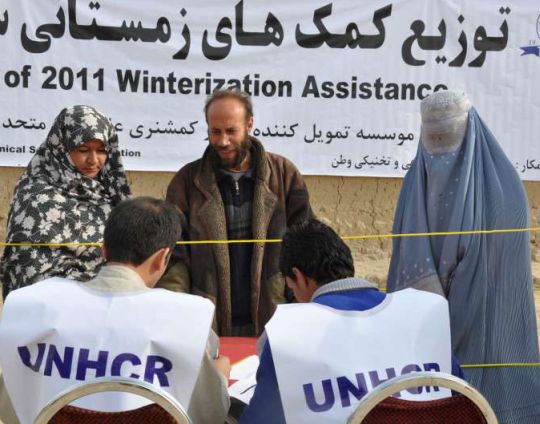UN refugee agency distributes winter supplies to needy Afghan families
UN refugee agency distributes winter supplies to needy Afghan families
 Vulnerable Afghan families line up to receive winter supplies in Dahsabz, a suburb of Kabul
Vulnerable Afghan families line up to receive winter supplies in Dahsabz, a suburb of Kabul
The United Nations refugee agency today began distributing urgently needed winter supplies to more than 200,000 displaced people in Afghanistan as night-time temperatures have plummeted to below freezing across the Asian country.
The UN High Commissioner for Refugees (UNHCR) and its partners handed out blankets, plastic sheets, warm clothes and fuel to more than 300 families in the Dahsabz district of the Afghan capital, Kabul, on the first day of the distribution.
“This joint winter assistance programme is vital for returnees and internally displaced people (IDPs) who are at particular risk during the cold winter months in Afghanistan,” said Jamaher Anwary, the Afghan Minister of Refugees and Repatriation.
In total, some 34,500 families, or more than 200,000 individuals, will receive the winter supplies.
Beneficiaries include “households that are run by women with no adult male support, families with elderly or disabled members [and] families with many children,” said Peter Nicolaus, the UNHCR Representative in Afghanistan. “In other words, really poor or desperately disadvantaged families who are in dire need of our support.”
Ms. Makai, a single mother of six who received blankets, clothes and other warm items, as well as two large sacks of coal and one large sack of flour, said: “These gifts mean everything to my young children and me. I am the only one old enough to bring in a bit of money, but my youngest was only born recently and I have not been able to find work because of her.”
In total, some 34,500 families, or more than 200,000 individuals, will receive the winter supplies – blankets, plastic sheets, sweaters, shawls, gloves, socks, waterproof shoes, gas, charcoal and coal – to help them stay warm and dry through the bitter winter. As in previous years, UNHCR is focusing its winter assistance effort on isolated rural areas.
Since the fall of the Taliban regime in late 2001, UNHCR has helped some 4.6 million Afghan refugees to return home voluntarily. Nearly three million registered Afghan refugees still live in exile in Pakistan and Iran.
Lack of jobs, food, shelter and security in parts of the country has made it harder for returnees to remain in their villages, according to UNHCR.
The agency and the Afghan Government are engaged in a consultative process involving neighbouring Iran and Pakistan to develop a strategy to support the refugees. The strategy will be presented to the international community at a conference in April.
###
> United Nations (UN).
 The United Nations was established on 24 October 1945 by 51 countries committed to preserving peace through international cooperation and collective security. Today, nearly every nation in the world belongs to the UN: membership totals 192 countries.
The United Nations was established on 24 October 1945 by 51 countries committed to preserving peace through international cooperation and collective security. Today, nearly every nation in the world belongs to the UN: membership totals 192 countries.
When States become Members of the United Nations, they agree to accept the obligations of the UN Charter, an international treaty that sets out basic principles of international relations. According to the Charter, the UN has four purposes:
- to maintain international peace and security;
- to develop friendly relations among nations;
- to cooperate in solving international problems and in promoting respect for human rights;
- and to be a centre for harmonizing the actions of nations.
###
* The above story is adapted from materials provided by United Nations (UN)
** More information at United Nations (UN)


















